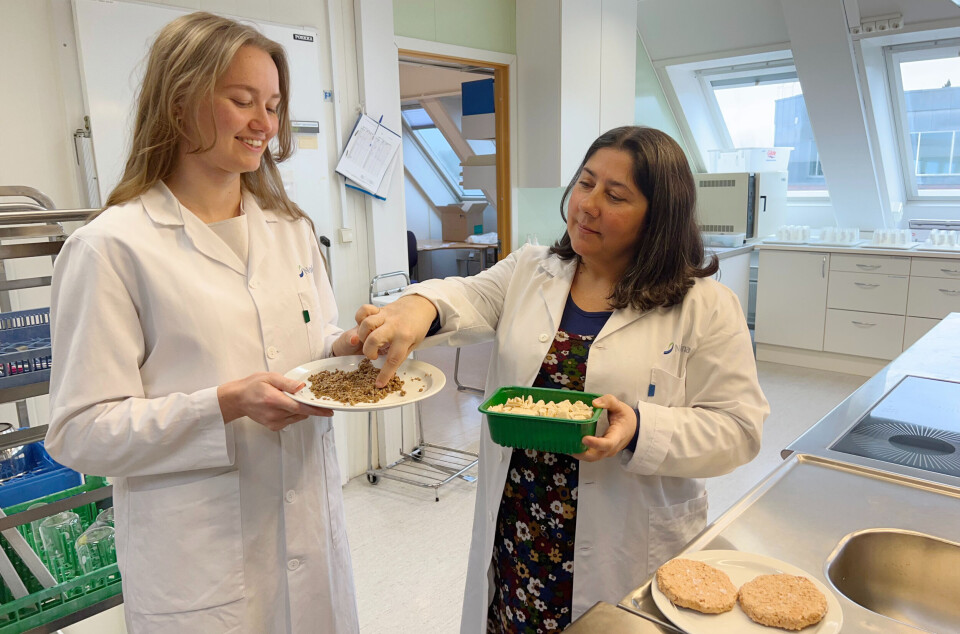THIS ARTICLE/PRESS RELEASE IS PAID FOR AND PRESENTED BY Nofima The Norwegian Institute of Food, Fisheries and Aquaculture Research - read more

The best plant-based burger does not imitate meat
That is what researchers and Nofima's sensory panel claim.
A plant-based burger doesn’t taste exactly like a beef burger. Soy milk doesn’t taste the same as cow’s milk.
Should plant-based products taste as similar as possible to their animal-based counterparts in order for more people to choose them? Well, not necessarily.
Professional tasters
“It’s not always the products that most resemble meat that turn out to be best liked,” Paula Varela-Tomasco says.
She is a senior scientist at Nofima and is in charge of the work of assessing plant-based products.
Nofima’s sensory panel comprises of professional taste testers, who not only describe the taste of the food, but also the texture and mouthfeel.
“Our sensory panel assesses the various plant-based products against their equivalent meat or dairy products. For the burgers, we have also progressed to consumer testing and examining nutritional content. In the future, we will also do the same with other categories,” Varela-Tomasco says.
In this way, researchers can find out exactly how a plant-based product differs from the corresponding meat or dairy product.
In addition to burgers, they have so far tested hot dogs, mince products, chicken substitutes, and plant-based dairy substitutes.
Taste expectations
“The goal is to look at the difference in taste, which represents one of the main reasons why consumers reject plant-based products. They expect a taste and texture that they don’t get,” she says.
Still, it turns out that the products that most resemble meat are not the products that people like best. In addition to the sensory panel, Nofima has also asked consumers to sample a variety of products.
“The best-liked plant-based burger was nothing like the meat products. It was vegetable-based, breaded and hardly resembles a regular beef burger," project manager and sensory scientist Solveig Nersten says.
“It has a completely different profile and doesn’t try to imitate meat. It can be used in the same way, but does not taste the same, and maybe it appears more natural to the consumer. This is one of the things we are working on better understanding,” Paula Varela-Tomasco says.
Easy and fast
She talks about plant-based products that contain a long list of ingredients and additives.
“This quest to imitate animal-based products is not necessarily the only way to get people to eat less meat,” she says. “What is important for many Norwegian consumers is that it should be simple to prepare. They want quick meal preparation, and they want to serve the new plant-based products in the same way that they have always served the products they are used to."
So if you’re cooking your meatballs or sausages, but with plant-based products, you don’t want the bother of new recipes. You just want to prepare the plant-based meatballs or meat-free sausages in the same way that you’ve always prepared regular meatballs and sausages.
Mapping flavour profiles
Varela-Tomasco and Nersten can now tell the industry which properties the different products have and how they are perceived by the consumers.
“We are mapping the differences between different plant-based foods and drinks and the products that they try to imitate. Previous research shows that taste and texture issues are the main barriers for more people to consume these products,” says Varela-Tomasco.
In the project VOM – Virkemidler for omstilling av matsystemet (Incentives for Measures for Food system Transition), Nofima scientists are collaborating with several other partners to encourage people to eat more plant-based food made from Norwegian raw materials.
“We focus on the sensory aspects, while other partners look at, for example, politics and other barriers,” Varela-Tomasco says.

This article/press release is paid for and presented by Nofima The Norwegian Institute of Food, Fisheries and Aquaculture Research
This content is created by Nofima's communication staff, who use this platform to communicate science and share results from research with the public. Nofima is one of more than 80 owners of ScienceNorway.no. Read more here.
See more content from Nofima:
-
Red algae grown in wastewater from fish-farming facilities could become sustainable salmon feed
-
Pumpkins are good for more than just Halloween decorations
-
This is how temperature affects a salmon's health and growth
-
Study: Omega-3 and zinc is a powerful duo for salmon
-
Fish may turn yellow if frozen too fresh
-
Is it better if food is packaged in plastic or paperboard?





































